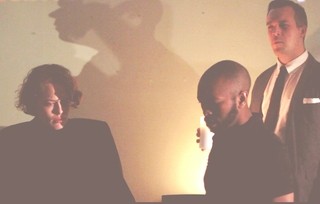|
Back
Emotional Effects of Amorous Affections New York
235 East 1st Street, Brooklyn
01/21/2016 - & January 22, 2016 (Symphony Space)
Claudio Monteverdi: Il combattimento di Tancredi e Clorinda – Interotte speranze
George Rochberg: Contra mortem et tempus
Salomone Rossi:Sonata prima detta “La Moderna”
Anton Webern: Enflieht auf leichten Kähnen, Opus 2 – Drei Lieder for voice, E flat clarinet and guitar, Opus 18
Luigi Dallapiccola: Due liriche de Anacreonte
Giulio Caccini: Amor, io parto
Cantata Profana: Emma McNairy (Soprano), Virginia Warnken Kelsey (Mezzo), Jonathan Woody (Baritone), Jonathan Blalock, Samuel Levine (Tenors), Jesse Han (Flute), Gleb Kanasevich (Clarinets), Eric Umble (Clarinet), Lee Dionne, Daniel Schlosberg (Piano, Harpsichord), Jeremy Rhizo (Baroque violin), Will Frampton (Baroque/modern viola), Hannah Collins (Baroque/modern cello), Arash Noori (Guitar/Lute/Concerto Profana producer), Jacob Ashworth (Baroque/modern violin, Conductor/Artist Director)

E. McNairy (Clorinda), J. Woody (Tancredi), S. Levine (Narrator)
(© Jiyeon Kim/Cantata Profana)
Like Hamlet’s Traveling Players, the musicians of Cantata Profana restlessly search for the right domain to exhibit their treasures. Rifling through old ConcertoNet reviews of this group, I had heard them playing to the rafters of St. Peter’s Church for Henze’s Kammermusik, Sheen Theater for Kafka and Kurtag, and the antiquated library from the House of the Redeemer to sing Monteverdi and George Crumb.
Last night, for an ancient tale of Medieval jousting and 20th Century serialism, Cantata Profana went deep into the heart of Brooklyn (actually the Nouveau Arte section of Williamsburg), their tales told under candlelight. True enough, tonight the more prosaic stage of Symphony Space will be their home. Yet this group always breaks the rules, both in domains and options.
Those previously ignorant of last night’s music might not have appreciated the links between Webern, Dallapiccola, Rochberg and Monteverdi. Nor did the program help in this matter. Perhaps the artists of the evening felt that music speaketh yea but a single tongue. Only the unwashed pleb (they might feel) would fail to notice the links of death, love, transfiguration and redemption. But without a good knowledge of Italian and German, not even the English surtitles on the wall were much help.
The only honest link was that 16th Century word “affections”, the emotions, the moods, the feelings which we were to feel in our own heart. Those who knew Rochberg’s Contra mortem et tempus understood how he had partly rejected his serialism for litany about the death of his son. It was obviously a piece of rage with the flutter-tonguing Gleb Kanasevich on clarinet, Daniel Schlosberg with sudden bangs of furor on the piano with all the instruments allowing sounds to burst out.
The works of Webern weren’t quite so blatant. Yet the opening very early a capella chorus gave at least the sense of emotion. One could easily follow the canonic score through the music of a composer who obviously loved Renaissance and Medieval music. Conductor Jacob Ashforth showed just how innovative Cantata Profana is when he repeated the chorus–this time not in close barber-shop harmony (dodecaphonically speaking) but with the singers spread out on four extremes of the stage. Webern, methinks would have approved, even relished the space more than the four singers.

V. W. Kelsey (© Jiyeon Kim/Cantata Profana)
Outside of the other Webern, and a beautifully sung set of Greek poems by Dallapiccola sung by mezzo Virginia Warnken Kelsey, the evening belonged to Monteverdi. It started with a typical male duet with a good Baroque continuo set of bass lute, harpsichord and cello But ended with the most dramatic work of the evening. Monteverdi’s setting of a Tasso poem.
I have heard this a dozen times, and still don’t know what to call it. Caccini (who was also represented here), made an opera 26 years before “The Combat of Tancredi ahd Clorinda”, Monteverdi had written his own lengthy (though never ever boring) operas. This, though, was a scene. Or perhaps, in Beethoven’s word, a ”scena”. It isn’t a trio, for the narrator has 80 percent of the words. It is more than music, for the two characters are supposed to duel on the stage.
Whatever it is, “The Combat” was staged as well as possible on this Brooklyn stage. Outside of barely seen projections, the lighting was by candle. And narrator Samuel Levine, properly dressed in suit and tie, used his own candle to light the two protagonists.
With little to say, Jonathan Woody, a mighty baritone in the first Monteverdi song, mimed his way through the duel, and showed all the right horror when his victim turned out to be his lover. As for soprano Emma McNairy, her very powerful soprano, as in the previous songs, was little heard here, for she too was part of the duel and denouement.
But at the end, as Narrator Levine and the instruments described that battle with both melodramatic and moving force, as Monteverdi’s genius for emotive force wreaked its emotional strength, we had that last moment which only a Monteverdi could create.
In one of her only utterances, the Saracen heretic McNairy leaned back to death and uttered those words that the Doors of Heaven waited for her.
It is doubtful that Honegger imitated Monteverdi in the last moments of Joan of Arc at the Stake? Yet one realized here that the most volatile emotions–or affections–did not need our modern appreciation. Equally, Cantata Profana made us again realize that neither the depths of Brooklyn or a cramped dimly lit stage can restrain artistry and compositional genius from the highest realm.
Harry Rolnick
|